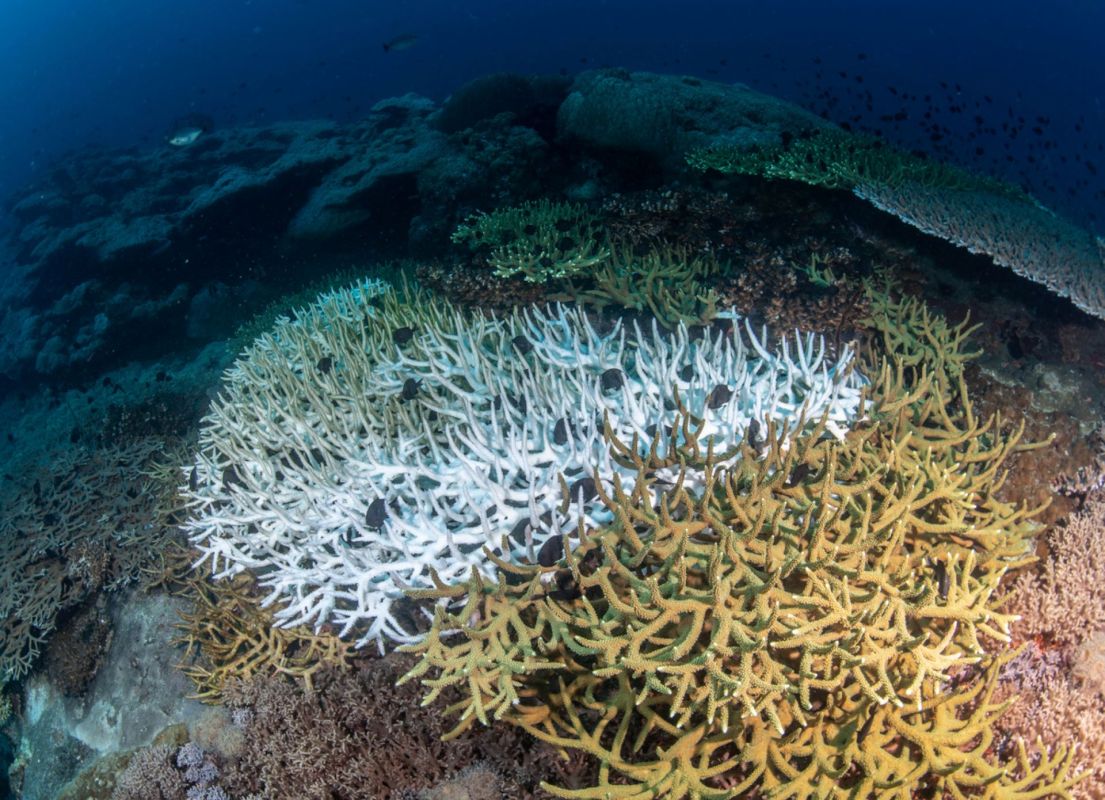Expect "unprecedented" health problems and death in coral species across the world throughout 2024, coral scientist Ove Hoegh-Guldberg said in a recent report by the Guardian.
Research suggests extreme marine heatwaves have contributed to climate change on coral reefs for four-plus decades. Now, "mass coral bleaching and mortality" may have reached a "tipping point," according to Hoegh-Guldberg.
What's happening?
Coral "bleaches," or turns white, when it's exposed to disease, storms, sediments, or other stressors, according to the Australian Institute of Marine Science.
Mass coral bleaching happens primarily because of an increase in water temperature. During this time, coral across a region lose their brown microbial algae and turn white. The phenomenon can also cause coral to die altogether.
In a scientific journal paper published in December 2023, researchers noted historical data on sea surface temperatures suggests a mass bleaching and a coral mortality event could take place in 2024, particularly with an El Niño that could spike temperatures even warmer than usual.
"The probability is that … we are going [to] see El Niño combine with warming sea temperatures and have a really big impact," Hoegh-Guldberg told the Guardian.
Why should you care about mass coral bleaching?
A potential mass coral bleaching event could cause long-term damage to ecosystems and the millions of people in the Earth's tropical regions who rely on them, Hoegh-Guldberg points out.
Additionally, when coral reefs bleach and die, the habitats on various reef species collapse. This could disrupt ocean biodiversity by as much as 25%, researchers say. Some scientists have even taken to deep-freezing some coral species to preserve them for the future to avoid extinction.
What's being done to address mass coral bleaching?
Mass coral bleaching is likely to get worse unless greenhouse gas pollution decreases, Hoegh-Guldberg notes.
To address the issue, Hoegh-Guldberg is urging global leaders to "move faster and with more determination than ever before" to reduce greenhouse gas pollution.
He's also encouraging these leaders to "trust the science" to teach people about this problem and how they can help put an end to it.
Meanwhile, there are many things you can do on a daily basis to protect coral reefs, such as:
Recycle and dispose of trash.
Dispose of trash properly, remember the three R's (reduce, reuse, and recycle, with the first two being the most important if enough people are lowering demand on manufacturing), and do your part to keep debris from reaching coral reefs.
Limit your use of fertilizers.
Don't use too much fertilizer on your lawn, since nutrients from this product may wash into waterways, move into the ocean, pollute the water, and damage reefs.
Spread the word.
Share what you know about mass coral bleaching and its dangers with family members, friends, and others. You can also contact your local representative to get additional information about what your state is doing to protect reefs.
It's easy, especially in many cooler parts of the world, to underestimate the importance of taking steps to slow the heating of our planet, but cases like this risk to coral can serve as a stark reminder that a couple of degrees of warmer temperatures can damage a delicate balance in many regions.
"We don't know the implications of such a spike in temperature," Hoegh-Guldberg said. "We may see storms that are even larger than the ones we've been seeing. These are the warmest temperatures ever on land and sea. … We are literally in uncharted territory, which we know very little about and don't know how to respond to, and I think we're dangerously exposed."
Join our free newsletter for weekly updates on the coolest innovations improving our lives and saving our planet.









